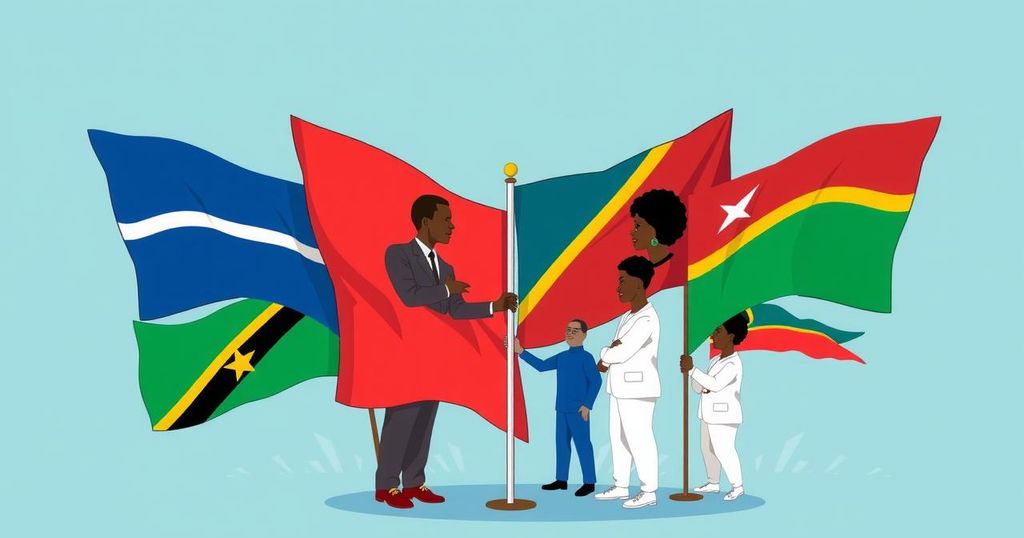Politics
ACT - WAZALENDO, AFRICA, ANGOLA, CCM, CCM CENTRAL COMMITTEE FOR IDEOLOGY, PROPAGANDA AND TRAINING, CHAMA CHA MAPINDUZI, CORRUPTION, DEMOCRACY, HUMAN RIGHTS, LEADERSHIP, MAINLAND, MASOUD, MASOUD OTHMAN, NORTH AMERICA, PAD, SONGWE, TANZANIA, TUN, TUNDU LISSU, UNITED STATES, ZANZIBAR
Fatima Khan
0 Comments
Tanzania Opposition and Ruling Party Exchange Blame Over Angola Incident
The article discusses the conflict between Tanzania’s ACT-Wazalendo opposition and the ruling CCM regarding the blockade of opposition leaders at an Angolan airport. Masoud Othman accused CCM leaders of misrepresentation and urged government accountability, while CCM officials defended their actions by stating procedural failures. The incident raised concerns about the greater implications for democratic leadership in Africa.
The ongoing dispute between Tanzania’s opposition party ACT-Wazalendo and the ruling Chama cha Mapinduzi (CCM) revolves around the incident of blocked entry for several opposition leaders into Angola. Masoud Othman, the ACT-Wazalendo Chairman, accused CCM senior officials of misrepresenting the circumstances surrounding the blockage of his convoy at Quatro de Fevereiro Airport in Angola. He urged governmental action against these leaders to protect the Tanzanian government’s image.
Othman, alongside other ACT-Wazalendo leaders and retired officials from various African nations, was prevented from attending the African Democracy Forum (PAD) due to the blockage, prompting condemnation from his party. In response, CCM Vice-Chairman Stephen Wasira stated that the Tanzanian government could not influence operations at Angola’s airport, which is under Angolan management. He suggested that those affected should consider whether they had followed the necessary protocols.
Hamis Mbetto, another CCM senior official, contended that the blockage was a direct consequence of the ACT-Wazalendo leaders failing to adhere to procedures for entering Angola. Othman refuted this claim, asserting that his delegation had obtained proper authorization from the authorities in Zanzibar and that necessary clearances had been communicated to the Ministry of Foreign Affairs and National Security Department.
In light of the incident, Othman expressed that the Tanzanian government should not be implicated in the blockage, highlighting that it was related to internal factors in Angola rather than Tanzanian interference. Mbetto responded to the accusations by questioning the accountability directed at him, stating that he had neither erred nor provoked the incident.
Dorothy Semu, an ACT-Wazalendo leader, raised concerns regarding the lack of communication from the government about the reasons for the blockage and called for clarification. Semu also reflected on the implications of this incident for the African Union’s leadership under the current Angolan president, suggesting he may not adequately reflect democratic principles. The PAD Forum, focusing on the future of African political cooperation, held a meeting in Angola, marking a continuing dialogue originally initiated in Poland and South Africa.
In conclusion, the exchange between Tanzania’s ACT-Wazalendo and the ruling CCM over the blockade of opposition leaders at an Angolan airport has raised significant political tensions. Othman accused the CCM of misrepresentation while the CCM leaders defended their stance, asserting that proper protocols must be followed. This incident highlights the complexities of Tanzania’s political landscape and stresses the need for clarity and accountability within the government. The reaction of the opposition and public call for explanations indicates a crucial moment for potential reforms in diplomatic engagements and the promotion of democracy across Africa.
Original Source: www.thecitizen.co.tz




Post Comment